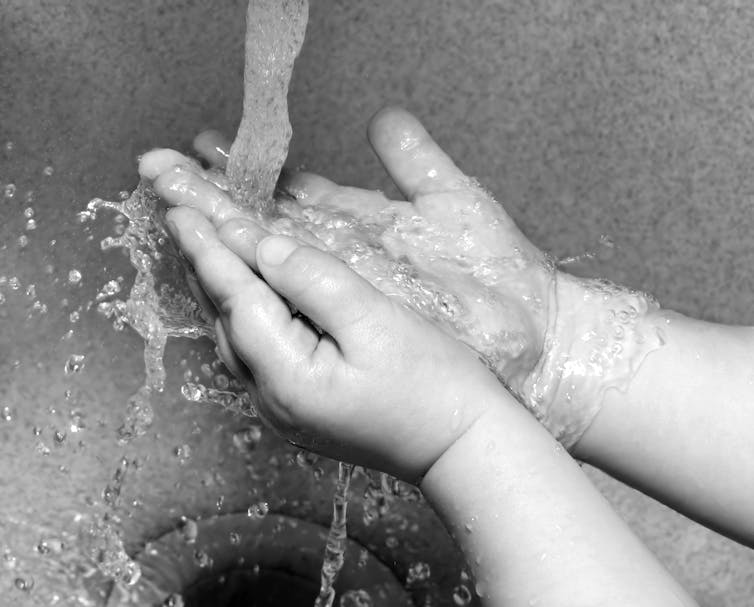Imagine feeling like you’re covered in germs that could kill you every time you come home from being in a public space. Before showering, you’d have to get inside without letting anything that’s touched the outside world come into contact with your house. The reality of living with obsessive compulsive disorder can be debilitating, and quite different from what people usually mean when they refer to themselves as being “a bit OCD”.
It is particularly heartbreaking to see children and adolescents suffering from OCD, which is often chronic and tends to continue into adulthood. We have now discovered that OCD in young people actually significantly alters both memory and learning ability.
OCD, which affects 2-3% of people at some point during their life, involves ritualistic behaviour such as constantly checking on things, placing objects in a certain order or washing hands repeatedly. This helps relieve intrusive thoughts in the short term, such as an obsession with things being “just right” or an intense fear of dirt or contamination. The condition can leave some sufferers unable to eat, leave the house or in other ways go about their daily lives, often becoming isolated and depressed as a result.
It is easy to see how disruptive and embarrassing OCD symptoms can be when a child starts attending school. Habitual repetitive checking can significantly delay the amount of time it takes to complete work in school or at home. Even things that should be fun, such as playing with friends, may become stressful if you’re constantly worried about getting messy or you’re scared of touching public play equipment.
Almost 90% of children and adolescents with OCD have problems at school, home or socially – with difficulties doing homework and concentrating being the two most common problems.
Memory and learning
In our recent study, published in Psychological Medicine, we asked 36 adolescents with OCD and 36 healthy adolescent controls to complete two memory tasks to measure learning and cognitive flexibility. Adolescent OCD patients showed significant impairments in both learning and memory.
The participants were also asked to complete a task to assess “goal-directed control”, an ability which helps us be flexible in our thinking and in our solutions to problems. Habits allow us to automatically perform behaviours that do not require planning or organisation, such as changing gears while driving. However, when there is new important information or rapid changes in the environment, we rely on goal-directed control instead. Again, the adolescents with OCD showed significant impairments in such control.
This is supported by functional neuroimaging of patients with OCD demonstrating increased activity in something called the “cortico-striato-thalamo-cortical circuits” in the brain, which are thought to be involved in control.
Sadly, the problems we identified may lead to stress and anxiety in a child, which is already known to promote the habitual behaviour that is so common in OCD – creating a downward spiral. Stress is also known to impair memory. And we know that stress hormone levels increase when children enrol in school.
What’s more, having learning and memory problems in childhood could lower confidence and affect self-esteem, which in turn are associated with OCD symptoms, especially checking.
While OCD in adults is slightly different from that in children and adolecents, we have found that adults with OCD do have problems with attention.
Treatment options
We know that memory problems can affect the efficacy of psychological treatment including cognitive behavioural therapy, which is currently the best way to treat OCD. This involves changing the way you think and behave in small steps. However, if this does not sufficiently alleviate symptoms, a kind of antidepressant (SSRIs) can help.
Actually tackling the learning and memory problems can also help to improve performance in school, as well as self-confidence. We have recently shown that cognitive training using a game on an iPad can improve memory problems in schizophrenia. However, future studies are needed to determine the exact relationship between the memory problems in OCD and the symptoms.

But what can schools do practically to help students with OCD? Anna Conway Morris, a consultant psychiatrist in Cambridgeshire and coauthor of the study, has recently been working with schools to support adolescents with OCD. She found that children with OCD often write very slowly or cross things out (to get it “just right”). Their handwriting speed should therefore be measured and, if necessary, they should be given additional time for exams or school work. OCD is also associated with lower processing speed – meaning children should be given more time to answer questions orally. They often get “stuck” on tasks and may need a prompt to move to the next task.
It is important to stress that children with OCD can be high achievers if they are given support to overcome their OCD symptoms. Treatment an early stage is really important. OCD often gets better in adulthood and even those who did not do too well at school often do well at university if they are given the right support.
That means that if we can make teachers aware of these learning and memory problems, they can help OCD students realise their full learning potential. Sadly, at present, it takes on average 11 years to diagnose OCD, and treatment starts after that. Who would find that acceptable for a physical disorder such as a heart problem or cancer? As a society we need to consider good mental health as every bit as important as good physical health.

